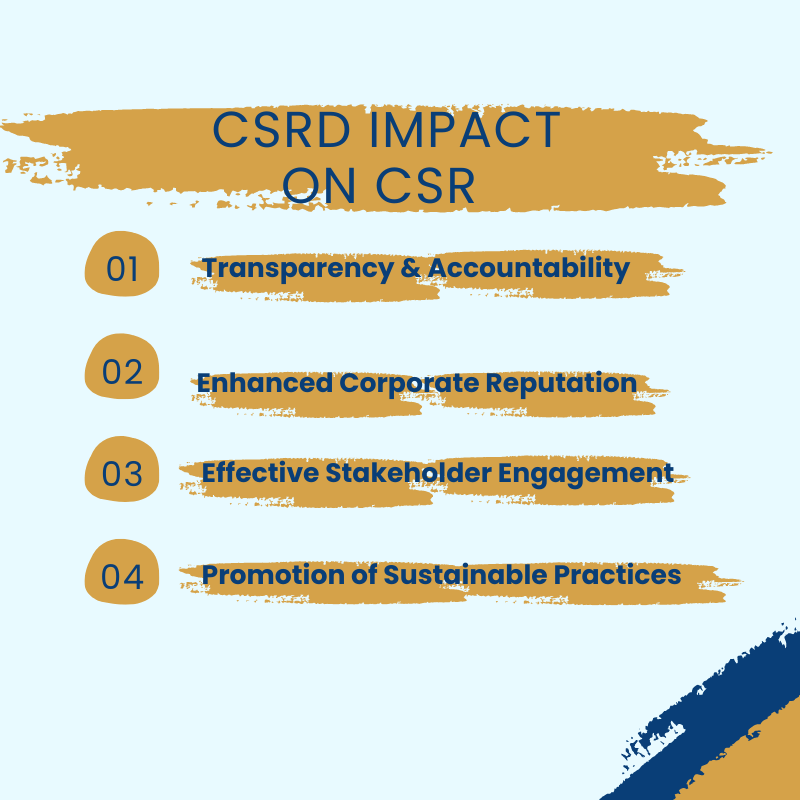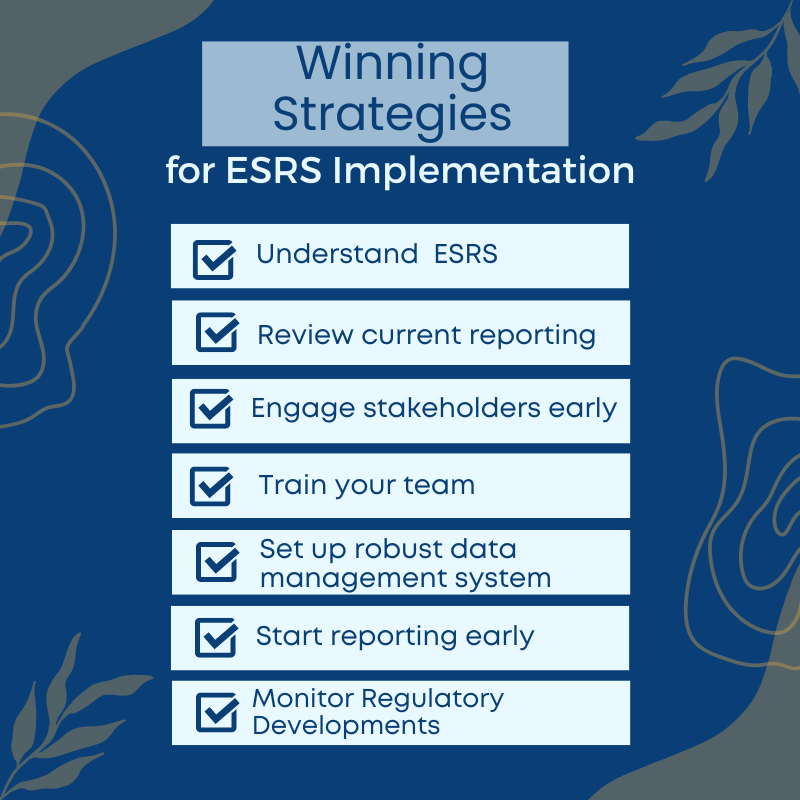In a world that’s continually evolving, Corporate Social Responsibility (CSR) remains a vital aspect of business operations. With the onset of the Corporate Social Responsibility Disclosure (CSRD) era, CSR has taken on new dimensions, reshaping businesses’ conduct, enhancing their transparency, and fostering sustainable development. Today, we delve into the essentiality of CSR in the current CSRD epoch.
A Glance at the Concept of CSR
Before diving into the impact of CSRD on CSR, it’s vital to understand the latter’s essence. At its core, CSR is an ethical framework in which businesses acknowledge the social and environmental implications of their activities. They integrate these considerations into their operations, aiming to alleviate any adverse impacts on communities and the environment. Let’s take a closer look.
What Is Corporate Social Responsibility (CSR)?
Corporate Social Responsibility (CSR) denotes the practice of companies taking responsibility beyond their primary aim of profit generation. This proactive initiative reflects the business’s commitment to positively impact society and the environment, integrating social and environmental concerns into their business operations. CSR activities can encompass various aspects, such as philanthropy, environmental initiatives, volunteering in the community, and ensuring ethical working conditions. The underpinning premise of CSR is that companies, as powerful societal stakeholders, ought to be socially responsible and exhibit ethical, social, and environmental consciousness.
Why Is CSR Important?
CSR is integral for multiple reasons. In today’s age, where stakeholders are increasingly becoming socially and environmentally aware, a company’s adoption of corporate responsibility can bolster its reputation. In effect, CSR extends the company’s business branding, exemplifying its values and ethical responsibility. Moreover, CSR can stimulate employees’ motivation as they prefer to engage in CSR for a company that has a positive impact on the world. Additionally, practicing corporate social responsibility aids in risk management, mitigating potential hazards. For instance, embracing environmental responsibility through sustainable business practices can curtail the risk of incidents that could adversely affect the company’s reputation and financial stability.
What Are the Benefits of CSR?
Numerous benefits are associated with CSR, making it a beneficial business strategy. A well-defined CSR strategy can enhance a company’s public image and brand, attracting customers and potential partners who value responsible business practices. This, in turn, can boost sales and profitability. From an internal standpoint, CSR can elevate employee morale and engagement, as staff members take pride in working for a company that prioritizes corporate citizenship. Furthermore, CSR programs can offer a competitive edge in the market and pave the way for new opportunities. For instance, a company known for its corporate sustainability may draw partners or clients specifically seeking businesses that align with environmental standards. Finally, CSR can mitigate certain operational and legal risks, particularly those related to environmental and social impacts and labor practices.
The EU CSRD and its Impact on Corporate Social Responsbility
The CSRD era encapsulates the requirement for companies to disclose their CSR activities, promoting greater transparency and accountability. It is an advancement that not only impacts companies but also influences shareholders, stakeholders, and society at large. In the face of increasing pressure for ethical conduct, the CSRD’s obligation for disclosure forces companies to introspect and actively incorporate sustainable practices.
The inclusion of CSR initiatives in the heart of business strategies and practices has become the new normal, and this change owes much to the evolving regulatory landscape emphasizing CSRD.

1. Transparency and Accountability:
With the advent of CSRD, there’s a greater emphasis on mandatory CSR disclosures. The directive requires businesses to share their CSR initiatives, outcomes, and impacts publicly. This heightened transparency implies that stakeholders, ranging from investors, customers, employees to regulatory bodies, now possess the means to critically examine a company’s environmental and societal initiatives. As a result, businesses are under greater pressure to fulfill their CSR commitments, enhancing their accountability. They must take steps to reduce any negative environmental impact and promote socially responsible behavior. Failure to do so can lead to reputational damage and even financial penalties, further underscoring the relevance of CSR.
2. Enhanced Corporate Reputation:
In the CSRD era, CSR initiatives are no longer viewed as discretionary activities but integral elements that determine a company’s standing in the market. Companies that can showcase genuine and impactful CSR efforts are likely to witness an improvement in their reputation. This favorable perception isn’t confined to the public but also influences investors and shareholders who increasingly prioritize ethical and sustainable operations. An enhanced reputation leads to increased customer loyalty, as consumers prefer to align with companies that share their values. It also attracts investment from socially-conscious investors and can contribute to improved financial performance, further demonstrating the critical role CSR plays in the CSRD era.
3. Stakeholder Engagement:
The CSRD fosters a culture of openness and engagement, requiring companies to actively involve stakeholders in their CSR strategies. This means businesses have to actively listen to their stakeholders’ expectations and concerns, ranging from environmental protection to worker rights. Such an engagement not only allows for more informed decision-making but also bolsters stakeholder trust and legitimacy. By showing that they care about stakeholders’ interests, companies can create a strong relationship with them, establishing a solid foundation for long-term success.
4. Promotion of Sustainable Practices:
One of the most compelling aspects of CSRD is its role in promoting sustainable business practices. The Euroepan Sustainability Reporting Standards (ESRS) compel businesses to incorporate sustainable practices into their operational and strategic frameworks. These could range from reducing greenhouse gas emissions, implementing fair labor practices, minimizing waste, promoting diversity and inclusion, to investing in community welfare. These efforts contribute to environmental protection and social welfare, promoting the overall wellbeing of society. Furthermore, they highlight the indispensable role CSR plays in paving the path towards a sustainable future.
In conclusion, the CSRD is leading to a paradigm shift, where CSR moves from the periphery to the core of business practices. This shift will bring about increased transparency and accountability, enhanced corporate reputation, improved stakeholder engagement, and promotion of sustainable practices, underlining the growing relevance of CSR in today’s business landscape.
The Future of CSR in the CSRD Era
As we advance in the CSRD era, CSR’s importance is projected to increase manifold. Businesses will not only have to fulfill their traditional roles but will also have to contribute towards societal and environmental well-being. As the narrative around CSR shifts from it being an option to it being a necessity, businesses need to adjust their strategies accordingly. They need to understand that CSR, in the current era, is not only about philanthropy but also about integrating sustainability into the business’s core values.
Conclusion
In the CSRD era, CSR has become more than an ethical consideration; it’s a business imperative that’s reshaping companies worldwide. The shift towards a more sustainable and equitable corporate world will undoubtedly have its share of challenges. However, the potential benefits to society, the environment, and businesses themselves make it a pursuit worth striving for. As we continue to navigate the CSRD era, the onus is on companies to rise to the challenge, seize the opportunities, and play their part in creating a better world.
In a nutshell, CSRD has heightened CSR’s significance, paving the way for a new era of sustainable and responsible businesses. As such, the importance of CSR in today’s world cannot be overstated.
Your Next Steps With CSRD and ESRS Sustainability Reporting
Get ready to lead the way towards a sustainable future with CSRD and ESRS Sustainability Reporting. Don’t wait any longer – it’s time to take action and position your company for success. Familiarize yourself and your team with the CSRD and ESRS reporting requirements today to ensure effective compliance and gain a strategic advantage in this evolving landscape.
Feeling overwhelmed? Don’t worry, you’re not alone. We’ve got you covered with a wealth of resources available on The CSRD Compass website. Explore in-depth guides, explanatory articles, comprehensive courses, and expert analyses all in one convenient place. The CSRD Compass is your ultimate destination for everything related to CSRD and ESRS.
Together, let’s embark on this transformative sustainability reporting journey, future-proof your business, and make a positive impact on our world. Your first step starts here, with The CSRD Compass.


